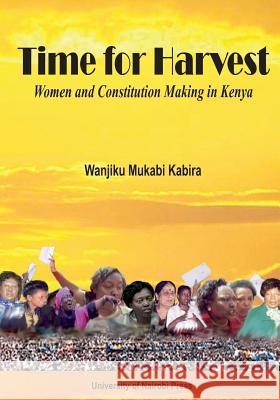Time for Harvest. Women and Constitution Making in Kenya » książka
Time for Harvest. Women and Constitution Making in Kenya
ISBN-13: 9789966792105 / Angielski / Miękka / 2012 / 466 str.
From the bleak days of severe marginalisation; days when words such as 'women's empowerment' or 'affirmative action' were taboo in Kenya, Time for harvest: Women and Constitution Making in Kenya traces women's struggles to change their status, their lives and their entire destiny. It is a brilliant exposition of the sheer ingenuity, perseverance and tenacity to contribute to the attainment of an all inclusive Constitution that banishes, inter alia, gender discrimination in all spheres of life, including social, economic, cultural, and political spheres. In this way, it opens up massive space for Kenyan women to 'exhale'. Wanjiku deftly tells the story of many great women actors in the struggle and the nature of their contribution while sparing us the pain that was suffered by individual women and their families as they identified with what at times seemed like mission impossible. They must be the women who, in her words, 'have names, hearts that ache, eyes that weep, feet that hurt'. The books is suitable for the general reader as well as scholars in cultural and feminist studies. Student of politics, law, history, sociology, anthropology and literature who want to know the path traveled by Kenyans - women specifically - in constitution making will find it useful.
From the bleak days of severe marginalisation; days when words such as womens empowerment or affirmative action were taboo in Kenya, Time for harvest: Women and Constitution Making in Kenya traces womens struggles to change their status, their lives and their entire destiny. It is a brilliant exposition of the sheer ingenuity, perseverance and tenacity to contribute to the attainment of an all inclusive Constitution that banishes, inter alia, gender discrimination in all spheres of life, including social, economic, cultural, and political spheres. In this way, it opens up massive space for Kenyan women to exhale. Wanjiku deftly tells the story of many great women actors in the struggle and the nature of their contribution while sparing us the pain that was suffered by individual women and their families as they identified with what at times seemed like mission impossible. They must be the women who, in her words, have names, hearts that ache, eyes that weep, feet that hurt. The books is suitable for the general reader as well as scholars in cultural and feminist studies. Student of politics, law, history, sociology, anthropology and literature who want to know the path traveled by Kenyans - women specifically - in constitution making will find it useful.











